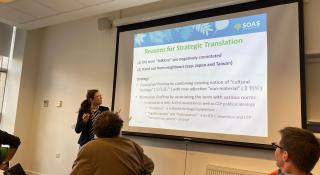
Breadcrumbs navigation
Addressing the global challenge of mass atrocity crimes: Looking ahead to the 2022 BISA IR2PWG annual conference
On 18 November 2022, the Intervention and the Responsibility to Protect Working Group (IR2PWG) will host its annual conference at the European Centre for the Responsibility to Protect (ECR2P), which is based in the School of Politics and International Studies at the University of Leeds. As one the group’s co-founders, I thought I would take this opportunity to reflect on the past decade and provide an overview of the conference to come.
IR2PWG was created in 2013 by Aidan Hehir, James Pattison, and me. In September 2012, I secured my first permanent post in the School of Politics and International Studies, University of Leeds, and emailed the only RtoP academic I knew, Aidan Hehir, whom I had met just once when I presented to his MA cohort. He was kind enough to entertain the idea and said he would discuss it with James Pattison. The rest, as they say, is history. On this point, I would say to any early-career researcher, do not be scared to reach out to academics in the field. Fortunately for me, both Aidan and James have been a continued source of help and inspiration. The same can also be said of BISA as an organisation which continues to go above and beyond.
The fact that both the group and the RtoP discourse have grown exponentially over the last decade does not say something positive about the world we live in. At the time of writing, the Global Centre for the Responsibility to Protect identifies thirteen current crises (Afghanistan, Cameroon, Central African Republic, Central Sahel, China, North Korea, Democratic Republic of Congo, Ethiopia, Israel and Occupied Territories, Myanmar, Syrian, Ukraine, and Venezuela), as well as two cases of ‘imminent risk’ (South Sudan and Yemen), and four of ‘serious concern’ (Eritrea, Mozambique, Nigeria, and Sudan). This list does not even take into account all the Global Centre's previously studied cases.
When one considers the millions of victims involved one can begin to see, as Cristina Stefan rightly points out, that ‘atrocity prevention is one of the most urgent and demanding global challenges of our times’. Indeed, when one considers the diverse range of factors involved in terms of geographical location (four continents), actors involved (state and non-state armed groups), regime types (democracies and non-democracies), atrocities in times of ‘peace’ (such as Philippines and North Korea), and atrocities in times of ‘war’ (Sudan and Sri Lanka), the complexity of this global challenge is all too evident.
Helping to address this, I worked with IR2PWG's convenors, Chloe Gilgan (University of Lincoln), Bola Adediran (Liverpool Hope University), and Alex Leveringhaus (University of Surrey), to put together the 2022 annual conference programme, titled Reimagining the Responsibility to Protect to meet new challenges. It brings together over thirty academics and practitioners from around the world to discuss four key themes: i) Ongoing Contestation of R2P; ii) New Challenges for R2P Implementation and Responsibility; iii) The Intersection between R2P and other Protection Norms and Neglected Contexts; and iv) Meeting New and Unresolved Challenges. These discussions raise a spectrum of thematic talking points such as diffusing and localizing the RtoP, non-Western contestation, norm-clusters, non-state armed groups, multinationals and non-governmental organisations, as well as the ethics of prioritisation. In so doing, they provide fresh insight into cases such as the Central African Republic, Darfur, Iraq, Syria, Nigeria, and Ukraine.
We are delighted to welcome Professor Alex Bellamy (University of Queensland) to give the keynote lecture. Professor Bellamy is widely regarded as the pre-eminent expert on the RtoP and having given the keynote lecture at the launch of the European Centre for the Responsibility to Protect in 2016, we are extremely pleased he is returning. In his talk, ‘Between Brussels, Helsinki, and Yalta: Human Protection and the Return of Imperial Orders’ he will look at how the RtoP and the politics of human protection are being buffeted by profound challenges to basic principles of international order. Focusing on Europe, but reflecting on global trends, this lecture examines how protection politics is being challenged and transformed by violent competition between three distinct visions of world order. Which vision prevails will shape the future prospects of not just RtoP but also human rights more broadly.
Finally, it is important to note that IR2PWG seeks to further BISA’s commitment to ‘knowledge exchange’ and ‘professional development’. To facilitate this, the 2022 annual conference is taking a number of steps. First, it is a hybrid conference to enable those unable to physically attend to still present and receive constructive feedback. This is also important for inclusion of scholars from the Global South who have valuable contributions to make to making RtoP more fit for purpose in our current world. Second, it brings together academics at all stages of their career and has included five presentations on each panel in order to provide as many opportunities as possible for early career researchers to be involved. Third, it is offering £750 travel bursaries to help foster broad and meaningful knowledge exchange. Fourth, the Editors of both Global Responsibility to Protect; and European Journal of International Security will be present and available to answer questions on publication. Fifth, important practitioner insights will be provided by Dr Kate Ferguson from; Protection Approaches on devolving RtoP in state practice; how social actors within states need to be the change they want to see in the world.
Conference registration closes on 21 October 2022
This article was first published by the European Centre for the Responsibility to Protect (ECR2P) and is reproduced here with kind permission.


